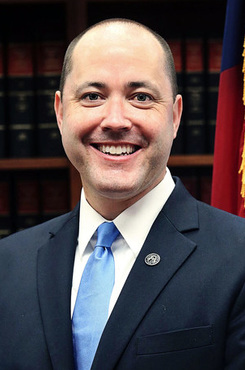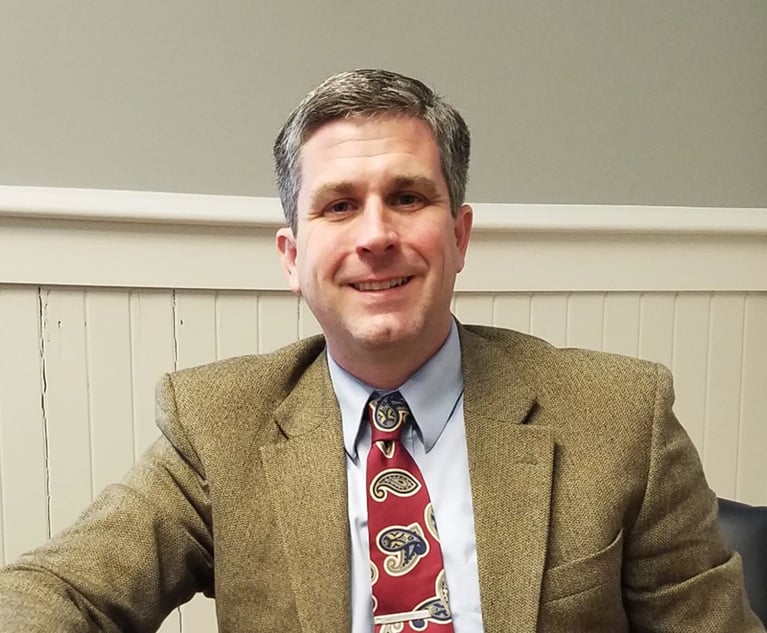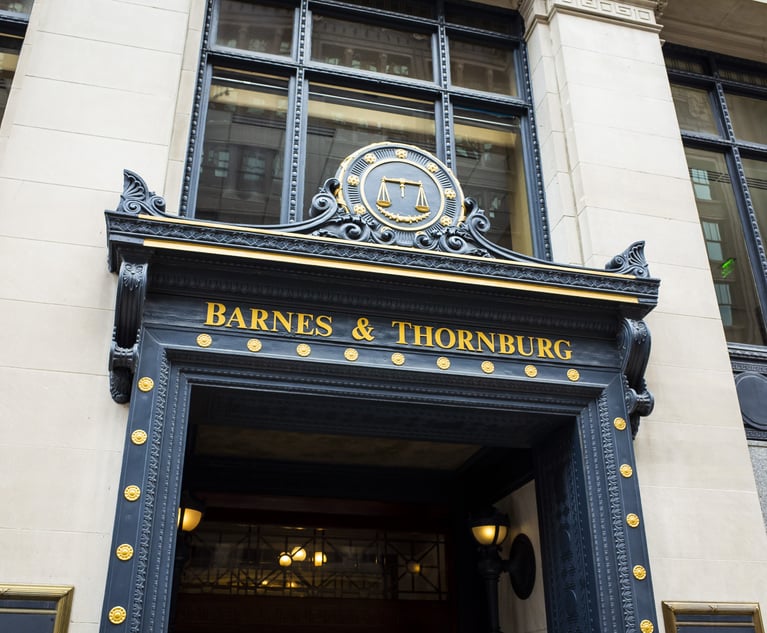Outside Counsel Picked for Georgia Opioid Litigation
The team has bipartisan credentials and will work under a contingency fee arrangement. It includes: John Bevis of the Barnes Law Group, The Cooper Firm, Franklin Law and Beasley Allen.
September 11, 2018 at 01:14 PM
6 minute read
 Georgia Attorney General Chris Carr (Courtesy photo)
Georgia Attorney General Chris Carr (Courtesy photo)Georgia Attorney General Chris Carr has named a powerhouse plaintiffs firm from Alabama and some well-known litigators at home to investigate and file lawsuits against makers and sellers of opioid drugs.
While Carr has yet to file any opioid-related litigation, he now has a team in place to do it.
The team has bipartisan credentials and will work under a contingency fee arrangement, according to the office. Carr announced the names Tuesday.
John Bevis of the Barnes Law Group in Marietta will be appointed special assistant attorney general (SAAG) for opioid litigation. The Barnes Law Group is to work in conjunction with The Cooper Firm in Marietta, Franklin Law in Savannah, and Beasley, Allen, Crow, Methvin, Portis & Miles in Montgomery and Atlanta.
“As Attorney General, I have dedicated every available resource our office has to fight the opioid epidemic—whether by increasing communication and coordination through our Statewide Opioid Task Force, cracking down on illegal prescribing through our Medicaid Fraud Control Unit or conducting training opportunities for law enforcement and prosecutors through our national partnerships,” Carr said in a news release, adding, “I feel very strongly that this legal team's combined experience and expertise will help put our legal team in the best position to ensure the interests of Georgians are protected.”
Carr is running as the Republican nominee in his first election for his job. Gov. Nathan Deal appointed Carr to replace Attorney General Sam Olens in 2016. Carr's opponent in the November election, Democratic nominee Charlie Bailey, worked for the Barnes firm before he became a gang prosecutor with Fulton County District Attorney Paul Howard.
Bailey's answer to an inquiry about Carr's opioid team Tuesday started with a compliment.
“Mr. Carr could not have picked more able attorneys than former Governor Roy Barnes and John Bevis, my friends, mentors and supporters at the Barnes Law Group,” Bailey said by email, through his lawyer and campaign spokesman, Jeff DiSantis.
The statement quickly moved, though, to criticism of Carr's lack of earlier action in opioid litigation.
“That said, it is unfortunate that Mr. Carr's delay in acting has put Georgia behind more than half of the states in the union, and has us filing at a time when one of the worst offenders in the opioid crisis, Purdue Pharma, is reportedly consulting with attorneys about filing bankruptcy to avoid accountability,” Bailey said. “When I am attorney general, I will take action to bring suit against every manufacturer and distributor who wrongly profited from opioids, and we will investigate whether criminal charges are warranted against companies and executives.”
The Montgomery-based Beasley Allen Law Firm is a big player on the team. Jere Beasley founded the firm in 1979 and is still actively engaged, now with a team of 75 lawyers and 200 support staff. The firm's credits include the largest pharmaceutical settlement on record—$5 billion, with Merck & Co., for Vioxx—and the biggest verdict in history against an oil company, ExxonMobil—just shy of $12 billion.
The Cooper Firm in Marietta is headed by Lance Cooper, a plaintiffs litigator who focuses on product liability. Beasley Allen and Cooper have worked together since 2014, when they jointly announced that Ken and Beth Melton would give back their $5 million settlement to GM so they could file a new lawsuit after learning the company knew about an ignition switch defect that they claimed killed their daughter, Brooke. That case led to 30 million GM recalls and hundreds of others cases for Cooper, Beasley Allen and plaintiffs firms across the country.
John Bevis works with the firm founded by former Georgia Gov. Roy Barnes, the last Democrat to lead the state. Barnes lost the job after one term, defeated by Republican and now-U.S. Secretary of Agriculture Sonny Perdue, who served eight years in the Capitol. Since Barnes left office and started the firm, The Barnes Law Group has focused on consumer protection and other cases on behalf of individuals, rather than corporations, under the slogan “Making it Right.” The firm is also representing Secretary of State Brian Kemp, Republican nominee for governor, in a lawsuit demanding a return to paper ballots. John Salter heads Kemp's effort. Salter is married to the governor's daughter, Allison Barnes Salter, who left the firm in 2016 when she ran for and was elected to an open seat on the Cobb County State Court.
Franklin Law is also a Georgia family firm, this one a father-daughter duo. Product liability plaintiffs litigator Rebecca Franklin Harris started the Savannah firm in 2009. Later, her father, Jimmy Franklin, joined her after practicing law with his own firm for decades in Statesboro. Jimmy Franklin is also a longtime member of the Judicial Nominating Commission under the Republican governors who succeeded Barnes. He also has served on the Judicial Qualifications Commission, the watchdog group for judges, and served as a SAAG before. Rebecca Franklin Harris handles cases involving consumer rights and product safety, as well as trucking accidents, medical malpractice, aviation disasters and premises liability incidents. She has battled major automakers in product liability cases. She is married to plaintiffs litigator Jeffrey Harris, a founding partner of Harris Lowry Manton in Atlanta and Savannah.
Carr invited qualified attorneys to submit proposals in May, following news that attorneys general in Florida and Texas had filed lawsuits, similar to those in other states, seeking damages from companies that profit from addiction to opioid painkillers. Carr issued a request for proposal for legal services seeking assistance of outside private counsel to work with the Law Department on investigation and possible litigation.
Those chosen were to serve as special assistant attorneys general in Georgia. Potential work was to include investigation, discovery, pleadings, trials and appeals, the RFP said.
Proposals had to identify the individual who would serve as the SAAG, if selected, and all attorneys who would work with the SAAG. Information sought included educational and professional background, particular abilities, and experience relevant to representation of the Georgia Department of Law.
The compensation arrangement seems more suited to the plaintiffs firms that Carr picked, rather than those operating on high hourly rates.
“It is anticipated that compensation for services performed will be solely based on a contingency fee,” the RFP said. “Proposals should set forth specific information for a contingency fee arrangement.”
Carr said his staff reviewed 20 proposals and interviewed seven groups of lawyers before picking the team.
This content has been archived. It is available through our partners, LexisNexis® and Bloomberg Law.
To view this content, please continue to their sites.
Not a Lexis Subscriber?
Subscribe Now
Not a Bloomberg Law Subscriber?
Subscribe Now
NOT FOR REPRINT
© 2025 ALM Global, LLC, All Rights Reserved. Request academic re-use from www.copyright.com. All other uses, submit a request to [email protected]. For more information visit Asset & Logo Licensing.
You Might Like
View All

Justice 'Weaponization Working Group' Will Examine Officials Who Investigated Trump, US AG Bondi Says


Georgia Justices Urged to Revive Malpractice Suit Against Retired Barnes & Thornburg Atty
4 minute readTrending Stories
- 1NBA Players Association Finds Its New GC in Warriors Front Office
- 2Prenuptial Agreement Spousal Support Waivers: Proceed With Caution
- 3DC Circuit Keeps Docs in Judge Newman's Misconduct Proceedings Sealed
- 4Litigators of the Week: US Soccer and MLS Fend Off Claims They Conspired to Scuttle Rival League’s Prospect
- 5Litigator of the Week Runners-Up and Shout-Outs
Who Got The Work
J. Brugh Lower of Gibbons has entered an appearance for industrial equipment supplier Devco Corporation in a pending trademark infringement lawsuit. The suit, accusing the defendant of selling knock-off Graco products, was filed Dec. 18 in New Jersey District Court by Rivkin Radler on behalf of Graco Inc. and Graco Minnesota. The case, assigned to U.S. District Judge Zahid N. Quraishi, is 3:24-cv-11294, Graco Inc. et al v. Devco Corporation.
Who Got The Work
Rebecca Maller-Stein and Kent A. Yalowitz of Arnold & Porter Kaye Scholer have entered their appearances for Hanaco Venture Capital and its executives, Lior Prosor and David Frankel, in a pending securities lawsuit. The action, filed on Dec. 24 in New York Southern District Court by Zell, Aron & Co. on behalf of Goldeneye Advisors, accuses the defendants of negligently and fraudulently managing the plaintiff's $1 million investment. The case, assigned to U.S. District Judge Vernon S. Broderick, is 1:24-cv-09918, Goldeneye Advisors, LLC v. Hanaco Venture Capital, Ltd. et al.
Who Got The Work
Attorneys from A&O Shearman has stepped in as defense counsel for Toronto-Dominion Bank and other defendants in a pending securities class action. The suit, filed Dec. 11 in New York Southern District Court by Bleichmar Fonti & Auld, accuses the defendants of concealing the bank's 'pervasive' deficiencies in regards to its compliance with the Bank Secrecy Act and the quality of its anti-money laundering controls. The case, assigned to U.S. District Judge Arun Subramanian, is 1:24-cv-09445, Gonzalez v. The Toronto-Dominion Bank et al.
Who Got The Work
Crown Castle International, a Pennsylvania company providing shared communications infrastructure, has turned to Luke D. Wolf of Gordon Rees Scully Mansukhani to fend off a pending breach-of-contract lawsuit. The court action, filed Nov. 25 in Michigan Eastern District Court by Hooper Hathaway PC on behalf of The Town Residences LLC, accuses Crown Castle of failing to transfer approximately $30,000 in utility payments from T-Mobile in breach of a roof-top lease and assignment agreement. The case, assigned to U.S. District Judge Susan K. Declercq, is 2:24-cv-13131, The Town Residences LLC v. T-Mobile US, Inc. et al.
Who Got The Work
Wilfred P. Coronato and Daniel M. Schwartz of McCarter & English have stepped in as defense counsel to Electrolux Home Products Inc. in a pending product liability lawsuit. The court action, filed Nov. 26 in New York Eastern District Court by Poulos Lopiccolo PC and Nagel Rice LLP on behalf of David Stern, alleges that the defendant's refrigerators’ drawers and shelving repeatedly break and fall apart within months after purchase. The case, assigned to U.S. District Judge Joan M. Azrack, is 2:24-cv-08204, Stern v. Electrolux Home Products, Inc.
Featured Firms
Law Offices of Gary Martin Hays & Associates, P.C.
(470) 294-1674
Law Offices of Mark E. Salomone
(857) 444-6468
Smith & Hassler
(713) 739-1250






